
PUMPA - SMART LEARNING
எங்கள் ஆசிரியர்களுடன் 1-ஆன்-1 ஆலோசனை நேரத்தைப் பெறுங்கள். டாப்பர் ஆவதற்கு நாங்கள் பயிற்சி அளிப்போம்
Book Free Demo “I see some very beautiful grounds,” I said, “and a lot of jolly children. It pains me, though, to see that they are not all so healthy and active-looking. When I came in, I saw one poor little girl being led about. She has some trouble with her eyes. Now I can see two more with the same difficulty. And there’s a girl with a crutch watching the others at play. She seems to be a hopeless cripple.”
Miss Beam laughed. “Oh, no!” she said. “She’s not really lame. This is only her lame day. The others are not blind either. It is only their blind day.”
I must have looked very surprised, for she laughed again.
Explanation:
The narrator began to describe what he could see through the window.

He saw a beautiful playground where a lot of children were happily playing.
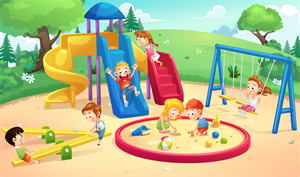
Jolly children in the playground
But there were a few children who looked quite unhealthy.
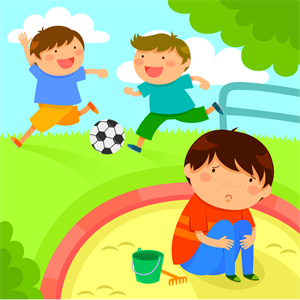
Sad and unhealthy look kid
He then remembered the bandaged girl he had seen when he had entered the school. He mentioned about it to Miss Beam. He also noticed that there were two more seemingly blind students.

A young boy whose eyes are covered
He also saw another girl on crutches. She seemed to be a physically disabled child. She also looked sad watching others at play, probably feeling unfortunate and sad for being a cripple.
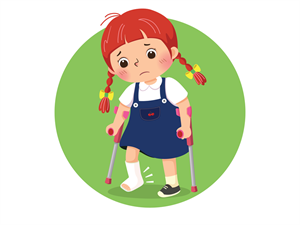
A young girl on crutches
The narrator seemed quite disturbed to see a lot of children with different kinds of disabilities.

The narrator was disturbed and sad
However, the response given by Miss Beam left the narrator confused! She laughed out loud. She looked very amused. Then she told the truth.
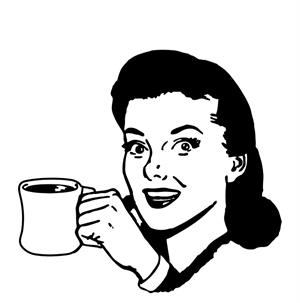
Miss Beam laughs
She said that the girl with a crutch did not have a disability. She was not lame but instead tried being one because it is a "lame day". Miss Beam also said that the other kids blindfolded themselves because it was their "blind day".
So, we can understand that the school had certain days, such as blind days or lame days. Such days offered the students an opportunity to understand the difficulties of the less fortunate people.
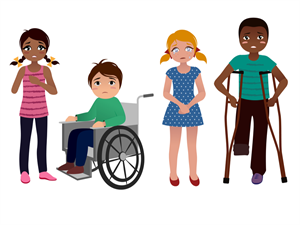
The school makes the students understand the difficulties of the disabled people
Meanings of difficult words:
Sl. No. | Words | Meanings |
1 | Grounds | Playgrounds |
2 | Jolly | Happy |
3 | Trouble | Problem |
4 | Crutch | A long stick used as a support under the armpit by a lame person |
5 | At play | Playing |
6 | Hopeless | Unfortunate; without hope |
7 | Cripple | Physically disabled; lame; someone who cannot walk without a support |
8 | Lame | Physically disabled; someone who cannot walk without a support; cripple |
9 | Blind | Visually challenged; someone who cannot see with their eyes |
Reference:
National Council of Educational Research and Training (2006). Honeysuckle. A Different Kind of School - E. V. Lucas (pp. 56-62). Published at the Publication Division by the Secretary, National Council of Educational Research and Training, Sri Aurobindo Marg, New Delhi.